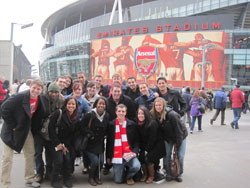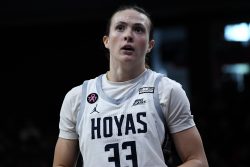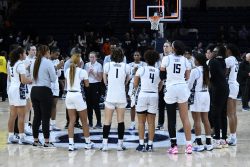While there is certainly no substitute for having an automatic jump shot, lightning-quick ball-handling skills, or being 6-foot-10, when it comes to landing a fantastic job in the sports world, Georgetown’s Sports Industry Management program still makes the Hilltop a great place to be for graduate students interested in a career in sports.


Matt Winkler (center, back) and students visited Emirates Stadium while in London. (Photo Courtesy GU SIM)
The three-year-old SIM program is the brainchild of current Program Director and Associate Dean Matt Winkler. With over 15 years of experience working in the sports industry, Winkler’s unique perspective affords the program highly experienced leadership and direction—an invaluable asset, considering its youth.
Along with Winkler, the program boasts an impressive 78-member faculty, all of whom are sitting sports executives. By comparison, Columbia University’s program has the second-most faculty in the nation, with 15. The SIM professors come from over 45 organizations, including the NCAA, The Tiger Woods Foundation, NFL, and USA Today, bringing diverse perspectives to their courses. These differing viewpoints are built into the fabric of each SIM course, as each class is taught by two professors coming from what Winkler calls “the two sides of the sports industry”—the team side and the agency or organization side.
In addition to the list of distinguished faculty, the layout and highlights of the program itself give students a competitive edge to help them succeed at the next level. The most noticeable feature is its length. At only one year full-time (with an option for two years part-time), it comes in at the shorter end of the spectrum compared to the roughly 300 other similar sports management programs.
“Many of the other programs that have been in the water for much longer than us are three-year part-time programs, and that’s not what’s good for someone entering the industry,” Winkler said. “Twenty-somethings have to get into the industry, and they have to do their program in one year.”
While the one-year program may be shorter than most, it packs in just as much learning and experience during that time. Along with four courses each semester, students intern with various teams and agencies to augment their education with meaningful experience in the industry. The courses are designed to support such full-time internships, as all classes are held between 5:30 and 10 p.m. Students connect their work experience to the program through blogs and online journals.
“I was working in another industry full-time, but I decided that I would be better served doing internships in the sports industry with the help of the program,” current ESPN employee and graduate of the SIM program Kelty Carpenter said. “With the combination of internships, master’s degree, and connections I made at the program, I graduated on a Saturday and had a job on Tuesday.”
For students, the program culminates with a capstone or thesis project focused on what is lacking in the sports industry.
“We want students working on forward-thinking projects that will help them get jobs,” Professor Jimmy Lynn said.
With such a stellar start and great response to the program, the SIM faculty has high hopes for its future.
“Our goal is to make this the leading global sports management program,” Lynn said. “We’re going into emerging sports markets, which strategically ties in to what Georgetown University is doing.”
This plan for global outreach again separates Georgetown from the pack of other sports management programs. In addition to the annual “London Week” trip, the program traveled to South Africa to meet with World Cup organizers, and plans to visit Brazil, China, and Qatar within the following year. Both Lynn and Winkler were in Brazil last month meeting with executives of the 2016 Olympic Committee and the 2014 World Cup Committee.
“All the next great global sporting events are not here, they’re in new lands,” Winkler said. “Georgetown is an international brand, and we’re not scared to go into these emerging markets where other programs wouldn’t dare step foot.”
London will host the Olympics next summer, while Qatar is on tap to host the World Cup in 2022. China is the world’s fastest growing sports market, especially after hosting the 2008 Beijing Olympics.
Once students graduate from the SIM program, they benefit from Georgetown’s superb alumni network in the sports industry, as well as the programs’ strategic partners, which include organizations like Under Armour and the NFL Players Association.
“[Georgetown’s] board has such figures as Ted Leonsis and former [NFL] Commissioner [Paul] Tagliabue, and the strategic partners we have are some of the leading names of the business,” Lynn said. “We’re also located in a huge sports town, which again makes our program really special.”
In only three years, the program has come far, showing why it is one of the best in the country. Still, all that progress has been met with soaring aspirations. Winkler and his colleagues won’t be satisfied until Georgetown becomes a global leader in sports management education.




